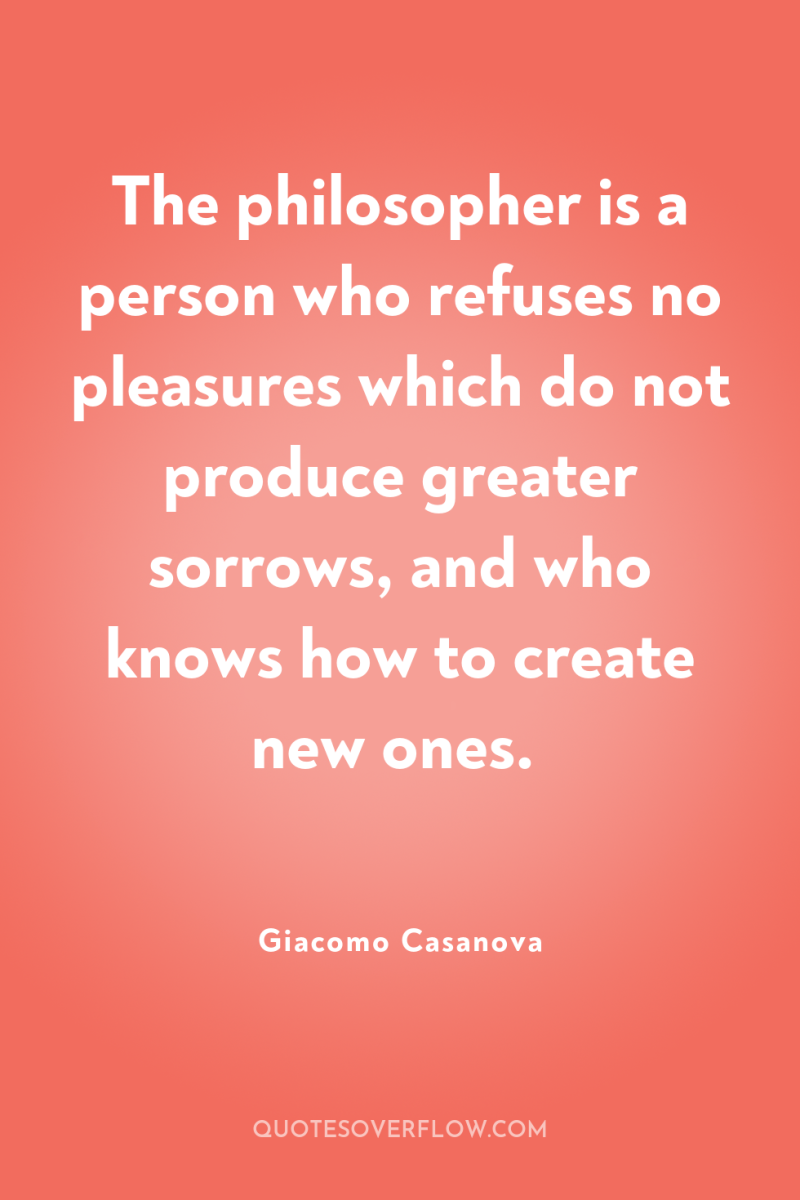
1
The philosopher is a person who refuses no pleasures which do not produce greater sorrows, and who knows how to create new ones.Giacomo Casanova
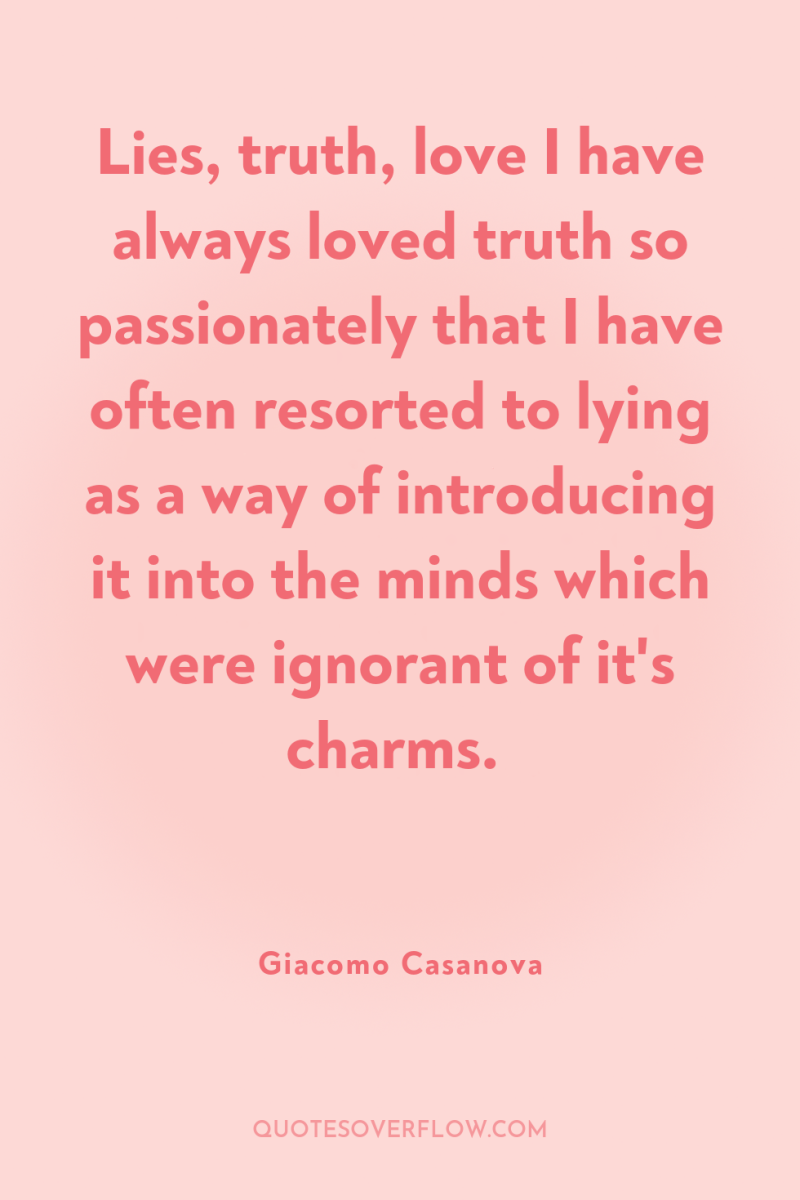
2
Lies, truth, love I have always loved truth so passionately that I have often resorted to lying as a way of introducing it into the minds which were ignorant of it's charms.Giacomo Casanova
3
There is no such thing as a perfectly happy or perfectly unhappy man in the world. One has more happiness in his life and another more unhappiness, and the same circumstance may produce widely different effects on individuals of different temperaments.Giacomo Casanova
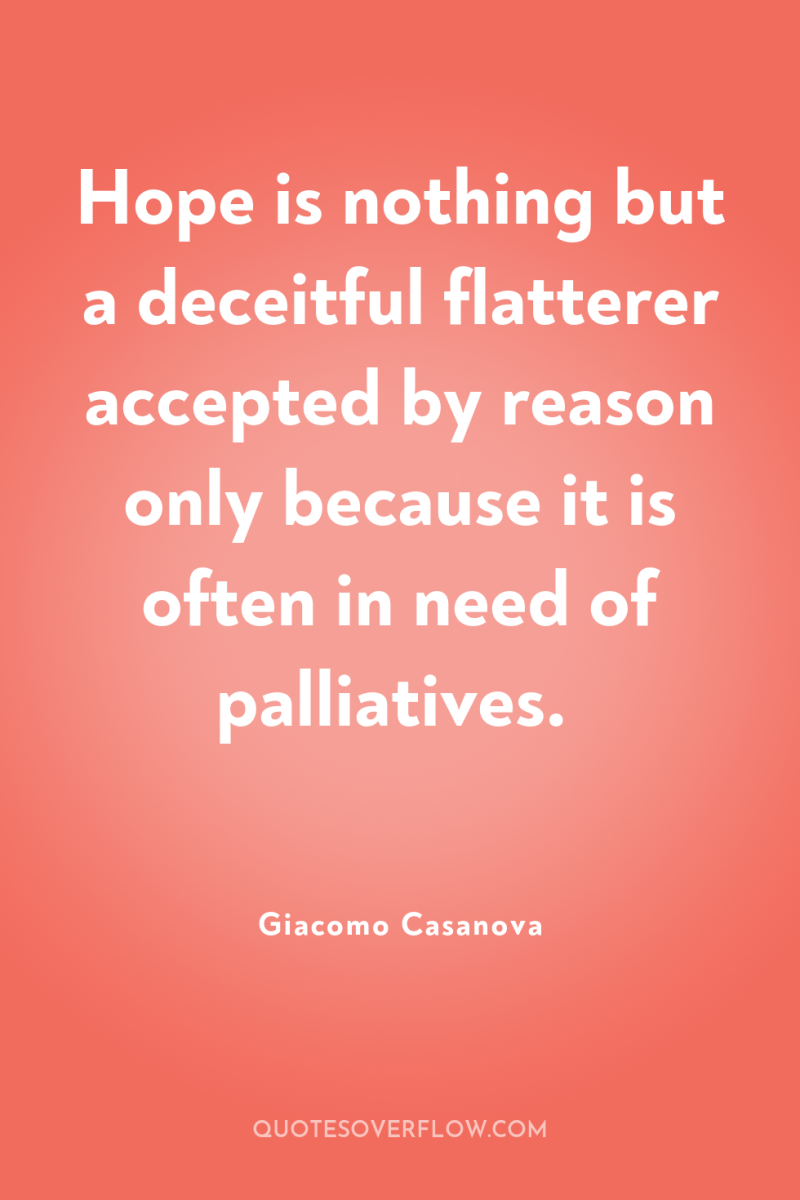
4
Hope is nothing but a deceitful flatterer accepted by reason only because it is often in need of palliatives.Giacomo Casanova

5
If you have not done things worthy of being written about, at least write things worthy of being read.Giacomo Casanova
6
As for myself, I always willingly acknowledge my own self as the principal cause of every good and of every evil which may befall me; therefore, I have always found myself capable of being my own pupil, and ready to love my teacher.Giacomo Casanova
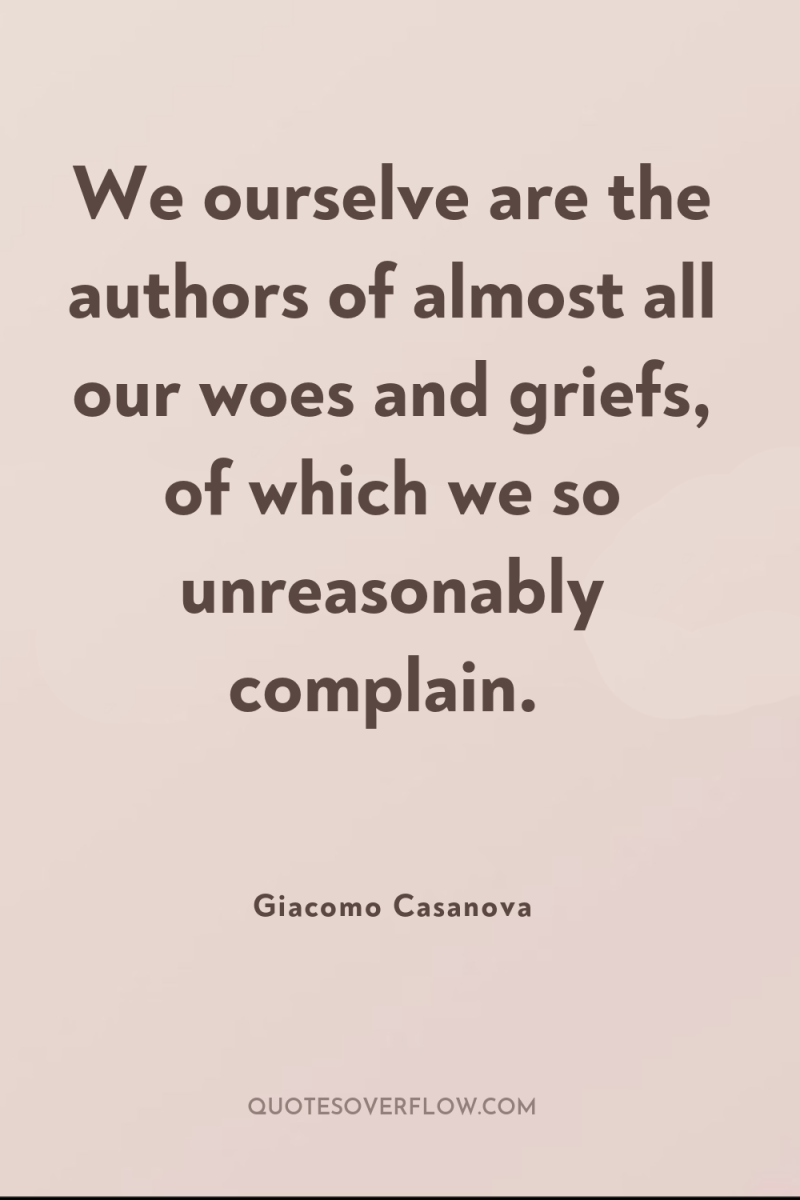
7
We ourselve are the authors of almost all our woes and griefs, of which we so unreasonably complain.Giacomo Casanova
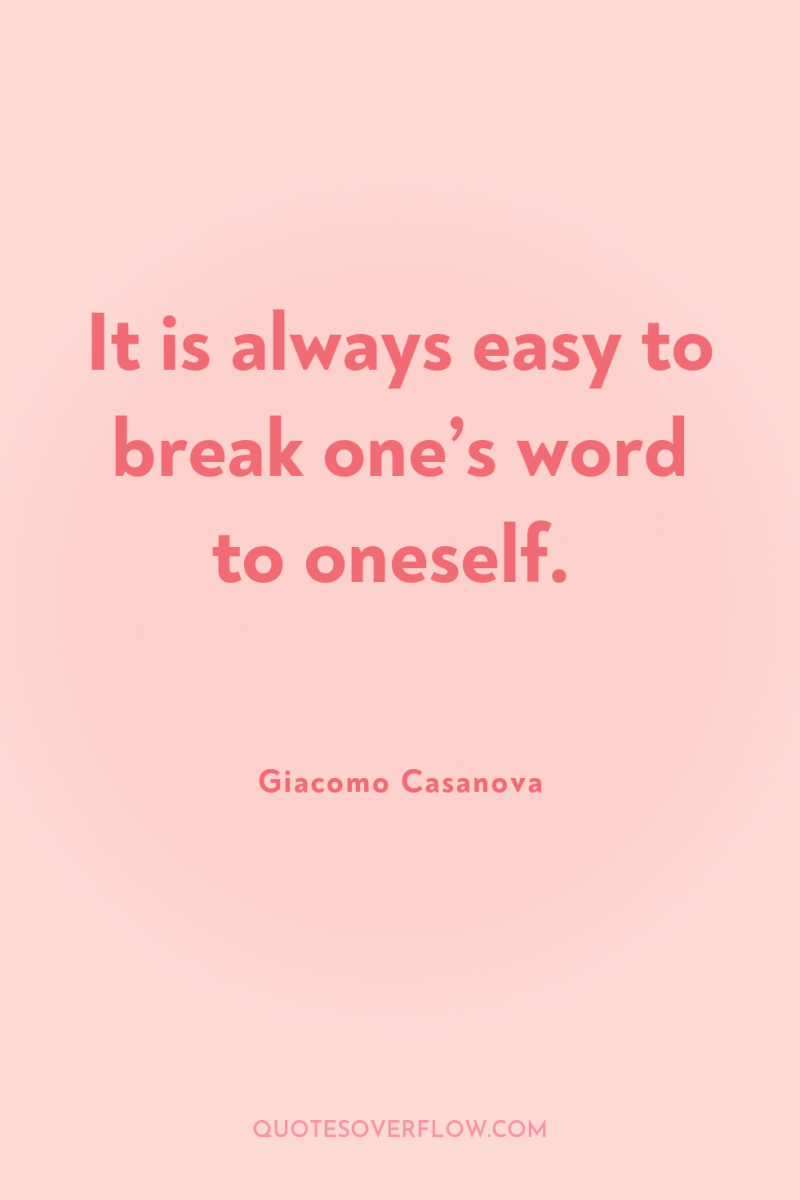
8
It is always easy to break one’s word to oneself.Giacomo Casanova
9
Be the flame, not the moth.Giacomo Casanova
10
To lead a blameless life you must curb your passions , and whatever misfortune may befall you cannot be ascribed by anyone to want of good luck, or attributed to fate; these words are devoid of sense, and all fault will rightly fall on your own head.Giacomo Casanova
11
There is no such thing as destiny. We ourselves shape our lives.Giacomo Casanova
12
Enjoy the present, bid defiance to the future, laugh at all those reasonable beings who exercise their reason to avoid the misfortunes which they fear, destroying at the same time the pleasure that they might enjoy.Giacomo Casanova
13
From that moment our love became sad, and sadness is a disease which gives the death-blow to affection.Giacomo Casanova
14
The man who seeks to educate himself must first read and then travel in order to correct what he has learned.Giacomo Casanova
15
The source of love, as I learned later, is a curiosity which, combined with the inclination which nature is obliged to give us in order to preserve itself. […] Hence women make no mistake in taking such pains over their person and their clothing, for it is only by these that they can arouse a curiosity to read them in those whom nature at their birth declared worthy of something better than blindness. […] As time goes on a man who has loved many women, all of them beautiful, reaches the point of feeling curious about ugly women if they are new to him. He sees a painted woman. The paint is obvious to him, but it does not put him off. His passion, which has become a vice, is ready with the fraudulent title page. ‘It is quite possible, ’ he tells himself, ‘that the book is not as bad as all that; indeed, it may have no need of this absurd artifice.’ He decides to scan it, he tries to turn over the pages–but no! the living book objects; it insists on being read properly, and the ‘egnomaniac’ becomes a victim of coquetry, the monstrous persecutor of all men who ply the trade of love. You, Sir, who are a man of intelligence and have read these least twenty lines, which Apollo drew from my pen, permit me to tell you that if they fail to disillusion you, you are lost–that is, you will be the victim of the fair sex to the last moment of your life. If that prospect pleases you, I congratulate you .Giacomo Casanova
16
Desires are but pain and torment, and enjoyment is sweet because it delivers us from them.Giacomo Casanova
17
They [his readers, whom he asks to be his friends] will find that I have always loved truth so passionately that I have often resorted to lying as a way of first introducing it into minds which were ignorant of its charms” (Casanova, p.34, Vol 1 Preface).Giacomo Casanova
18
I have never done anything in my life except try to make myself ill when I had my health and try to make myself well when I had lost it. I have been equally and thoroughly successful in both, and today in that particular I enjoy perfect health, which I wish I could ruin again; but age prevents me.Giacomo Casanova
19
What do you want to say to me?’‘ Nothing–just to talk about the profession I am entering. I am about to practice virtue in order to find a man who loves it only to destroy it' [replied Mademoiselle Vesian.]‘That is it exactly; and believe me, everything in this life is much the same. We refer everything to ourselves, and each of us is a tyrant. That is why the best of mortals is he who is tolerant. .Giacomo Casanova
20
The sweetest pleasures are those which are hardest to be won.Giacomo Casanova
21
Love becomes imprudent only when it is impatient to enjoy; but when it is a matter of procuring the return of a happiness to which a baleful combination of circumstances has raised impediments, love sees and foresees all that the most subtle perspicacity can discover.Giacomo Casanova
22
Love is a great poet its resources are inexhaustible but if the end it has in view is not obtained it feels weary and remains silent.Giacomo Casanova
23
Happy are those lovers who when their senses require rest can fall back upon the intellectual enjoyments afforded by the mind! Sweet sleep then comes and lasts until the body has recovered its general harmony. On awaking the senses are again active and always ready to resume their action.Giacomo Casanova
24
The longer you remain in Rome, ' said [Cardinal] S.C., ‘the smaller you will find it.Giacomo Casanova
25
In the mean time I worship God, laying every wrong action under an interdict which I endeavour to respect, and I loathe the wicked without doing them any injury.Giacomo Casanova
26
It is only necessary to have courage, for strength without self-confidence is useless.Giacomo Casanova
27
I have often met with happiness after some imprudent step which ought to have brought ruin upon me, and although passing a vote of censure upon myself I would thank God for his mercy.Giacomo Casanova
28
I have met with some of them - very honest fellows, who, with all their stupidity, had a kind of intelligence and an upright good sense, which cannot be the characteristics of fools.Giacomo Casanova
29
I learned very early that our health is always impaired by some excess either of food or abstinence, and I never had any physician except myself.Giacomo Casanova
30
I always made my food congenial to my constitution, and my health was always excellent.Giacomo Casanova
31
I have had friends who have acted kindly towards me, and it has been my good fortune to have it in my power to give them substantial proofs of my gratitude.Giacomo Casanova
32
The man who has sufficient power over himself to wait until his nature has recovered its even balance is the truly wise man, but such beings are seldom met with.Giacomo Casanova
33
I know that I have lived because I have felt, and, feeling giving me the knowledge of my existence, I know likewise that I shall exist no more when I shall have ceased to feel.Giacomo Casanova
34
For my future I have no concern, and as a true philosopher, I never would have any, for I know not what it may be: as a Christian, on the other hand, faith must believe without discussion, and the stronger it is, the more it keeps silent.Giacomo Casanova
35
Heart and head are the constituent parts of character; temperament has almost nothing to do with it, and, therefore, character is dependent upon education, and is susceptible of being corrected and improved.Giacomo Casanova